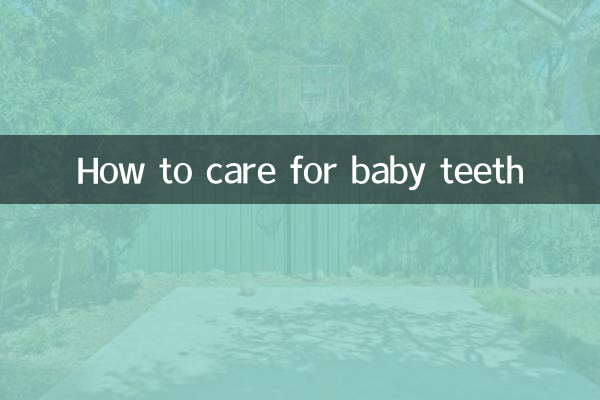How to care for baby teeth: a comprehensive guide and hot topic analysis
Baby dental care is one of the key topics that new parents pay attention to. With the recent rise in discussions on social media and parenting forums, we have compiled popular content for the past 10 days, combining professional advice to provide you with structured data and practical guides.
1. Popular topics on baby dental care recently

| topic | Popularity index | Main discussion points |
|---|---|---|
| Symptoms of teething | ★★★★★ | Recommended natural teeth grinding rods, gum massage techniques |
| First tooth cleaning time | ★★★★☆ | Best start time controversy (4 months vs 6 months) |
| Use of fluoride toothpaste | ★★★☆☆ | Safe Dosage Discussion (Rice Grain Size vs Pea Size) |
| Relationship between night milk and tooth decay | ★★★☆☆ | Impact of night weaning time on dental health |
2. Baby teeth development timeline
| Months | Dental development stage | Nursing focus |
|---|---|---|
| 0-6 months | Gum preparation period | Gum cleaning wipes |
| 6-12 months | The lower incisors emerge | Use silicone finger braces toothbrush |
| 12-18 months | Cute teeth on the front | Soft bristle toothbrush introduction |
| 18-24 months | The first molar appears | Develop teeth brushing habits |
3. 5 hot nursing methods test
Based on recent actual tests by parenting bloggers, we have compiled the most popular nursing methods:
1.Gauze cleaning method: Wrap your fingers with sterile gauze and gently wipe your gums and teeth surfaces dipped in warm water. Feedback from multiple mothers is the easiest way to accept.
2.Silicone finger brace toothbrush: Babies prefer to bite during teething. This design can not only cleanse and relieve tooth discomfort. Safety reviews of popular brands show that choosing BPA-free material is crucial.
3.Fluoride toothpaste dispute: The American Dental Association recommends using rice-sized fluoride toothpaste starting from the first tooth, but some European countries recommend using it after the age of 2. Recently, experts recommend that the local water quality fluorine content be determined.
4.Dietary Management: Avoiding long-term exposure to sugary liquids is the key to preventing "bottle caries". Latest research shows that feeding a small amount of clean water after drinking milk can effectively reduce risks.
5.Dentist's first visit time: Traditional concepts are enough to see a dentist after the age of 3, but modern dentistry recommends that the first examination be arranged within 6 months after the first tooth erupts, which has become a hot topic recently.
4. Frequently Asked Questions (Recent High-frequency Questions)
| question | Professional answers |
|---|---|
| Is tooth fever normal? | Slight body temperature rise (<38℃) may be related, but continuous high fever requires medical treatment |
| What to do if your teeth are yellow? | It may be plaque, and it needs to be cleaned; long-term use of iron may also lead to |
| Do you need to clean after night milk? | Ideally, it is clean, but it can be diluted when it is difficult to operate. |
| Is it dangerous to swallow toothpaste? | Special fluoride toothpaste for children is safe at the recommended dosage |
5. Latest expert suggestions (updated in 2023)
1.Brushing posture: Using the "knee to knee" method, one parent fixes the baby and the other brushes the teeth, which is more thorough than a single person.
2.Teeth protection tools: In addition to conventional toothbrushes, floss sticks should also be used when the teeth are adjacent, which is a focus that has been overlooked recently.
3.Eating habits: Avoid frequent snacks and keep them within 3 times a day to allow the mouth to have enough time to restore pH.
4.Fluoride supplementation: It is recommended to consult a doctor in non-high fluorine areas to perform systematic supplementation, rather than relying solely on toothpaste.
5.Behavior guidance: It is more effective than coercion to allow babies to brush their teeth through picture books, doll demonstrations, etc. This is a new suggestion from child psychologists recently.
Baby dental care requires a combination of parents’ patience and scientific approaches. As research progresses, it is recommended to review the latest guidelines every six months to ensure the most appropriate care regimen. Remember that early healthy habits will lay the foundation for your child’s lifelong oral health.

check the details

check the details